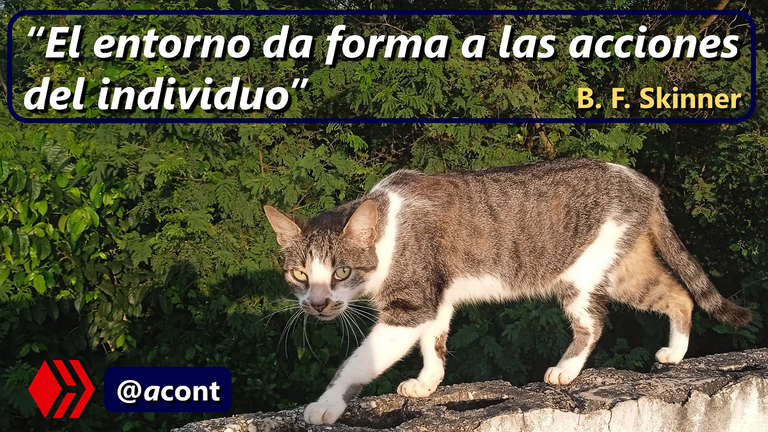Hay mucho que reflexionar desde el lado humanístico respecto a la psicología. Es por lo anterior que en esta semana se ha planteado un reto muy interesante el cual es expresar un punto de vista propio respecto a la siguiente frase:
“El entorno da forma a las acciones del individuo.”
B. F. Skinner
Este es el enlace de la iniciativa: Iniciativa: Cultura Humana Semana 2: Psicología.
La contribución de cada usuario en esta iniciativa seguramente aportará ideas valiosas y nutrirá al feed de la comunidad #Humanitas. Intentaré dar mi punto de vista o reflexión al respecto, te invito a continuar la lectura y espero que te inspire a dejar tu opinión en los comentarios e incluso a participar en la iniciativa de esta comunidad, Humanitas.

Esta frase de B. F. Skinner nos habla de dos cosas: el entorno y las acciones. Se habla de las acciones como dependientes del entorno. Nuestras acciones no serían actos originados desde nuestro libre albedrío o decisión individual, sino que serían totalmente influenciadas por el entorno en donde crecimos o vivimos.
Las acciones, desde un punto de vista más "metafísico", podría decirse que se originan a partir del deseo. Ninguna acción se origina de la nada, sino que hay un deseo que la impulsa. Por ejemplo, ir a la nevera a tomar agua, proviene del deseo de calmar la sed. Hasta el más mínimo movimiento involuntario del cuerpo proviene de un deseo, incluso no hacer nada proviene del deseo de no hacer nada, y también es una acción.
Ahora la pregunta es ¿De donde viene el deseo? ¿Qué tan consciente somos de que nos mueve el deseo? El origen del deseo sería un tema bastante profundo, que puede involucrar distintas creencias metafísicas, religiosas o filosóficas, por lo que no viene mucho al caso. Lo que si podríamos intentar averiguar es si nuestras acciones las mueven deseos conscientes o si en realidad el entorno nos controla completamente.
Creo haberlo ya mencionado en una publicación anterior en Hive, pero una vez en una conversación alguien me habló de la analogía de una piedra que vuela por los aires luego de la erupción de un volcán. La piedra no tiene consciencia de que el origen de su impulso fue un volcán, y en esa misma situación podríamos estar nosotros, si es que no somos conscientes de que nuestras acciones no son controladas por nosotros sino por algo externo.

Desde mi punto de vista, estoy en parte de acuerdo con la frase de B. F. Skinner. Es decir, desde el punto de vista biológico/evolutivo, e incluso desde el punto de vista psicológico, estamos muy programados a reaccionar con nuestro entorno, imitar patrones, imitar lo que nuestros padres hicieron o lo que nos enseñaron en la escuela, sin estar muy consciente de ello o de manera casi automática.
Los animales o plantas simplemente reaccionan con el entorno. se adaptan a él. Lo puedes ver cuando intentas curarle las heridas a un animal, como a un gato o un perro, reaccionan al dolor y huyen pero no están conscientes del bien que les estamos haciendo.
Los seres humanos somos un poco más "avanzados" en este aspecto, pero eso no quita que seamos altamente influenciables por nuestro entorno. Yo diría que en un 90% nuestras acciones son formadas por el entorno, pero en un 10% tenemos la posibilidad de marcar la diferencia y "salirnos del guion" mediante nuestras decisiones. Pero es algo que requiere cierto nivel de consciencia, madurez o desarrollo emocional.

La acción podría decirse que es formada por la emoción, y siempre me gusta referirme a la emoción como "energía en movimiento". Depende de nosotros saber controlar la emoción, el mecanismo primitivo que se formó durante millones de años, para que se guíe con sabiduría y no con el caos del entorno.
Por lo que, en resumen, estoy de acuerdo parcialmente con la frase citada en la iniciativa. El entorno forma en gran medida nuestras acciones, pero tendríamos acceso a un pequeño margen, para "salirnos de la programación", y ser más conscientes de nuestras decisiones.
Si has llegado hasta aquí, gracias por leer este contenido, espero que te haya hecho reflexionar. Aprovecho para invitar a participar en la iniciativa aún vigente a @rosahidalgo @slwzl @efectivida @germanandradeg @tibaire @liveofdalla @irvinc @damarysvibra
¿Cuál es tu opinión? Deja tus comentarios u opinión al respecto.
English version
There is so much to reflect on from the humanistic side with respect to psychology. It is for this reason that this week a very interesting challenge has been posed, which is to express one's own point of view regarding the following sentence:
"The environment shapes people's action"
B. F. Skinner
This is the link to the initiative: Initiative: Human Culture Week 2: Psychology.
The contribution of each user in this initiative will surely bring valuable ideas and contribute to the feed of the #Humanitas community. I will try to give my point of view or reflection on this, I invite you to continue reading and I hope it inspires you to leave your opinion in the comments and even participate in the initiative of this community, Humanitas.

This sentence by B. F. Skinner tells us about two things: the environment and actions. Actions are spoken of as dependent on the environment. Our actions would not be acts originated from our free will or individual decision, but would be totally influenced by the environment where we grew up or live.
Actions, from a more "metaphysical" point of view, could be said to originate from desire. No action originates from nothing, but rather there is a desire that drives it. For example, going to the refrigerator to drink water comes from the desire to quench thirst. Even the slightest involuntary movement of the body comes from a desire, even doing nothing comes from the desire to do nothing, and is also an action.
Now the question is Where does desire come from? How conscious are we that we are moved by desire? The origin of desire would be a rather deep subject, which may involve different metaphysical, religious or philosophical beliefs, so it is not really relevant. What we could try to find out is whether our actions are driven by conscious desires or whether we are in fact completely controlled by our environment.
I think I mentioned this in a previous post on Hive, but once in a conversation someone told me about the analogy of a stone flying through the air after the eruption of a volcano. The stone is not aware that the origin of its impulse was a volcano, and we could be in the same situation, if we are not aware that our actions are not controlled by us but by something external.

From my point of view, I partly agree with B. F. Skinner's statement. That is, from a biological/evolutionary point of view, and even from a psychological point of view, we are very programmed to react with our environment, to imitate patterns, to imitate what our parents did or what we were taught in school, without being very conscious of it or almost automatically.
Animals or plants simply react with the environment. they adapt to it. You can see it when you try to heal the wounds of an animal, like a cat or a dog, they react to the pain and run away but they are not aware of the good we are doing to them.
Humans are a bit more "advanced" in this aspect, but that doesn't take away from the fact that we are highly influenced by our environment. I would say that 90% of our actions are shaped by our environment, but 10% we have the ability to make a difference and "go off script" through our decisions. But it is something that requires a certain level of awareness, maturity or emotional development.

Action could be said to be shaped by emotion, and I always like to refer to emotion as "energy in motion". It is up to us to know how to control emotion, the primitive mechanism that was formed over millions of years, so that it is guided by wisdom and not by the chaos of the environment.
So, in summary, I partially agree with the phrase quoted in the initiative. The environment largely shapes our actions, but we would have access to a small margin, to "get out of programming", and be more aware of our decisions.
If you have made it this far, thank you for reading this content, I hope it has made you think. I take this opportunity to invite @rosahidalgo @slwzl @efectivida @germanandradeg @tibaire @liveofdalla @irvinc @damarysvibra to participate in the still ongoing initiative.
Leave your comments or opinion about it.
Translated to English language with the help of DeepL.com
Fotografías de autoría propia.
Otras redes sociales:
 |
 |
 |
 |
F1 & motorsports: @acontmotor
 |
 |
 |
 |
| ¡Gracias por visitar! — ¡Thanks for visiting!  |


